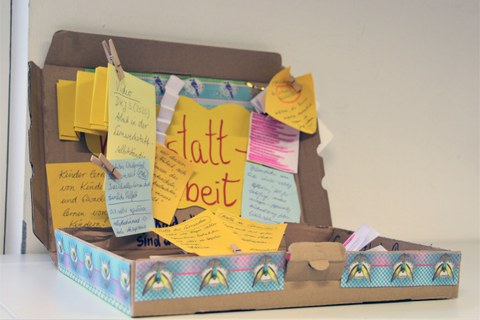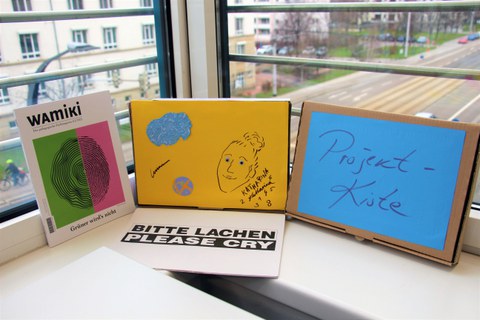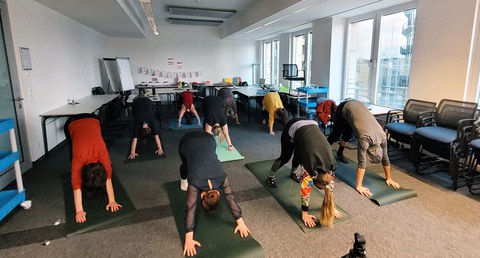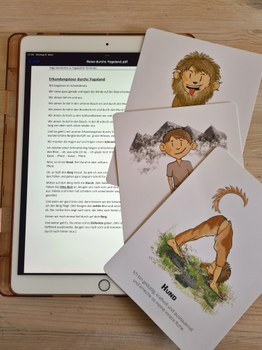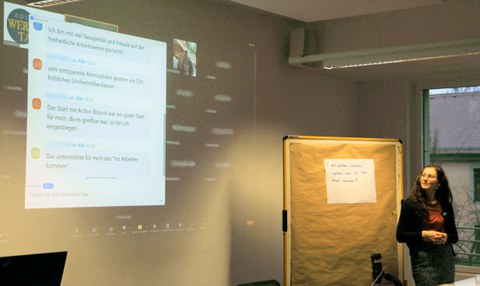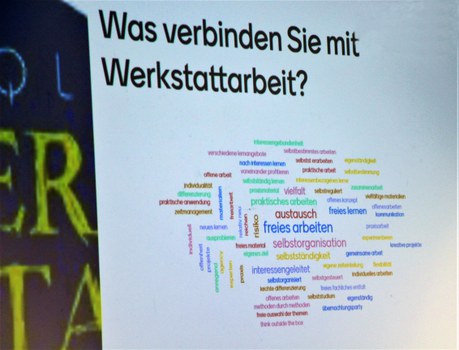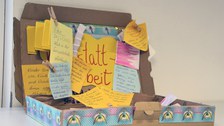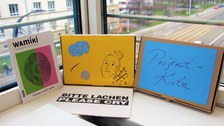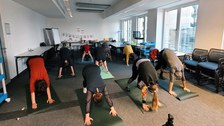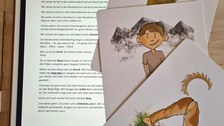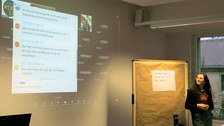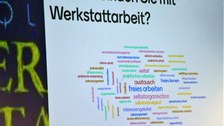Apr 18, 2023
First hybrid workshop days in second career qualification g: a great success!
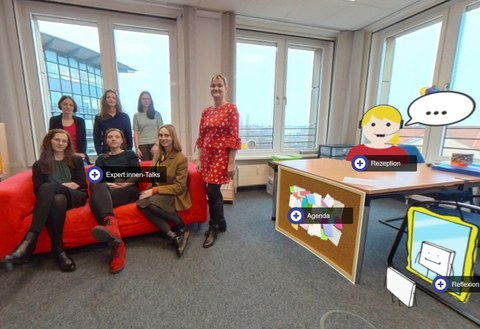
First hybrid workshop days at BQL: digital and analog workshop work
For the first time, participants in the in-service qualification for elementary school teachers (BQL GS) experienced a hybrid workshop week (09.-12.01.2023). The focus was on the learners' exploratory, problem-solving and creative engagement with materials and situations. The learning opportunities included a spatial exploration with the Actionbound app, an examination of Maria Montessori's teaching and learning methods and language-sensitive teaching. The BQL-GS participants tried out working independently in the learning workshop and created creative learning boxes for their own learning process.
The 2023 workshop days were an experiment between the analog and digital worlds. Both the approximately 80 participants and their lecturers were required to rethink their didactic approach and thus open up their approach to learning stimuli. The result of the four-day workshop reflected an intensive examination of four different offerings.
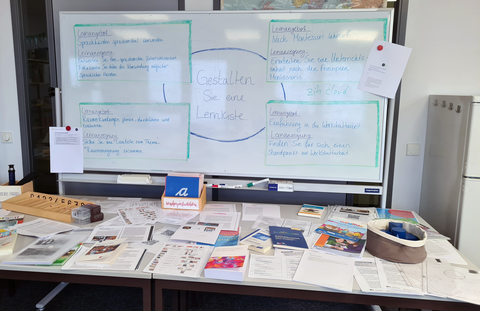
Materialien zur Werkstattarbeit
Learning offer "Introduction to workshop work" (by Dr. Melanie Wohlfahrt)
In the "Introduction to workshop work" learning opportunity, participants were invited to develop their own viewpoint on workshop work as a concept. They were able to do this in a variety of ways, such as experimentally exploring the BQL workshop or reflecting on their own experiences on the workshop days, various specialist literature and handouts, as well as examples from primary school practice. The expert talk served as a discussion forum. Here, pros and cons could be weighed up and critical questions constructively discussed.
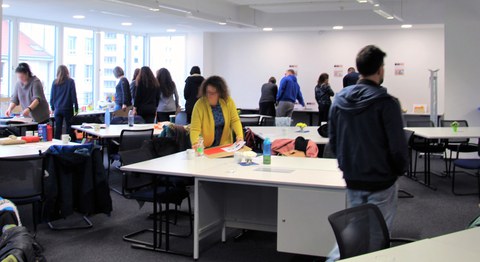
Weiterbildungsteilnehmende bei der Werkstattarbeit
Learning opportunity "Planning, conducting and evaluating spatial explorations" (by Dr. Peggy Germer, Dr. Anja Mede-Schelenz and Malte Krone)
In the "Planning, carrying out and evaluating spatial explorations" learning offer, the participants went on a special kind of spatial exploration with the help of an Actionbound app. The app was used to develop an exciting rally through the rooms of the Word Trade Center (WTC) in Dresden especially for the participants. They discovered the building in an interactive and playful way with quiz questions from a geographical perspective ("How high is the tower of the World Trade Center?", "In which direction are you looking?", "How can you get an overview of the WTC?"). In the discussion that followed, the rally prompted the participants to think about what a transfer could look like for primary school children in their own school building, on the school grounds or on the way to school, or even in their own city. Furthermore, the focus of interest was on how the pupils could independently present relevant places in a scavenger hunt.
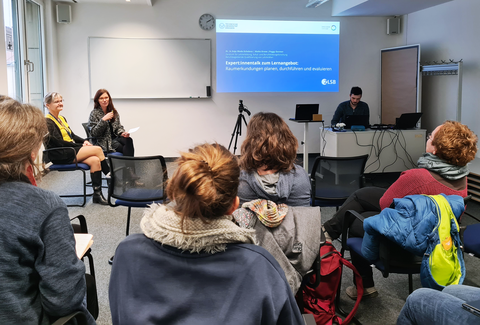
Diskussionsrunde zum Lernangebot „Raumerkundungen planen, durchführen und evaluieren“
Learning opportunity "Teaching according to Montessori?" (by Katharina Weinhold and Susan Böttcher)
As part of the "Teaching according to Montessori?" activity, participants followed in Montessori's footsteps and considered whether and how the Montessori concept can be used in mainstream schools. The aim of the offer was to reflect on one's own teaching approaches by approaching a reform pedagogical concept and, if necessary, to develop new practical approaches. To this end, Ms. Böttcher and Ms. Weinhold provided various texts, film sequences and mathematical Montessori materials. For example, there was the golden "pearl material" (to illustrate the Fundamental Principles of the decimal system) to discover or the "blue solids" (introduction and exercise in the properties of geometric solids). Educational materials for Montessori German lessons, such as the "Sentence Star" (for introducing and practicing syntax and determining sentence elements), invited children to explore and discover. In an open and stimulating discussion round, the participants and lecturers exchanged ideas for use in schools.

Diskussionsrunde im Rahmen des Angebotes „Nach Montessori lehren?“ © D. Oertel

Eindrücke aus dem Lernangebot „Nach Montessori lehren?“ (von Katharina Weinhold und Susan Böttcher) © D. Oertel

Montessori-Materialien aus dem Lernangebot „Nach Montessori lehren?“ © D. Oertel
Learning offer "Overcoming language barriers in a language-sensitive way" (by Aurica Borszik and Dr. Olga Bazileviča)
The learning opportunity "Overcoming language barriers in a language-sensitive way" offered participants the opportunity to approach the topic of language-sensitive (specialist) teaching in an interest-based way. There were a variety of suggestions, e.g. to identify language barriers in mathematics lessons and to think about solutions for dealing with them sensitively. A central topic of the expert talk was the reflection of a self-experiment: The participants attempted to present an educational language issue in a foreign language that they had a good command of. In this way, a change of perspective on the use of German in different specialist contexts was achieved.
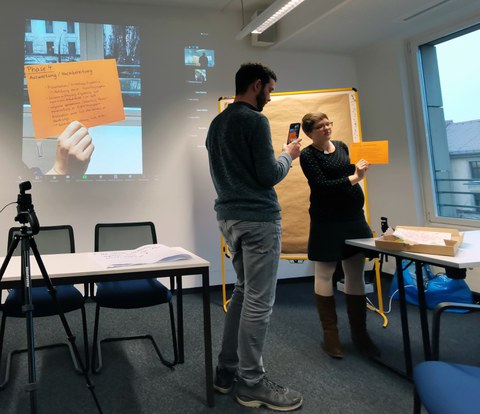
Weiterbildungsteilnehmerin Fr. Märtin präsentiert ihre Ergebnisse bei der Abschlussveranstaltung der hybriden Werkstattwoche
The concept of the hybrid workshop days
The hybrid format of the workshop days presented all stakeholders with exciting and unique challenges over several months of preparation: For example, both virtual and physical materials had to be conceived and designed for all four learning stimuli. The learning organization itself took place virtually via an OPAL course. In addition to learning opportunities, expert:innentalks and discussion rounds, there was to be the opportunity to relax in the analog or digital break room with yoga, quizzes and coffee breaks. In addition, there was always the question of how best to support in-person and virtual participants. There was therefore an introductory event in presence and on site and many support offers, which were transmitted into the virtual room by Mr. Krone(BQL.Digital) together with the lecturer team via live streaming. He was in charge of designing the accompanying OPAL course with a digital 360-degree application for virtual exploration of the real rooms. Ms. Oertel from BQL.Digital also supported the use of digital tools for workshop learning.
The workshop days were evaluated with a joint closing event, both analog and virtual. In a hybrid gallery tour at the end, the training participants presented the independently created learning boxes with many suggestions for teaching at primary level.
The following quotes from the anonymous online survey conducted by four BQL-GS participants at the final event support the success of the workshop days:
"I particularly liked the fact that I was able to move around freely on site for most of the day and let my interests guide me. The first day on site was very important for me to gain an overview. On the second day, I was able to continue learning from home. Overall, the openness of the workshop days suited my learning style."
"I found the openness of the format appealing. It was inspiring and you also had time to just browse and discover. I would like to see more activating activities, discussions and inspiring presentations. Some of it was very text-heavy."
"Technical implementation totally successful! Thank you very much."
"I really liked the cooperative learning, the exchange on practical topics during the break, the possibility of free time management and the choice of learning paths as well as the yoga lesson. I would continue tomorrow immediately."
Dr. Peggy Germer(peggy.germer@tu-dresden.de) and Dagmar Oertel (dagmar.oertel2@tu-dresden.de)




